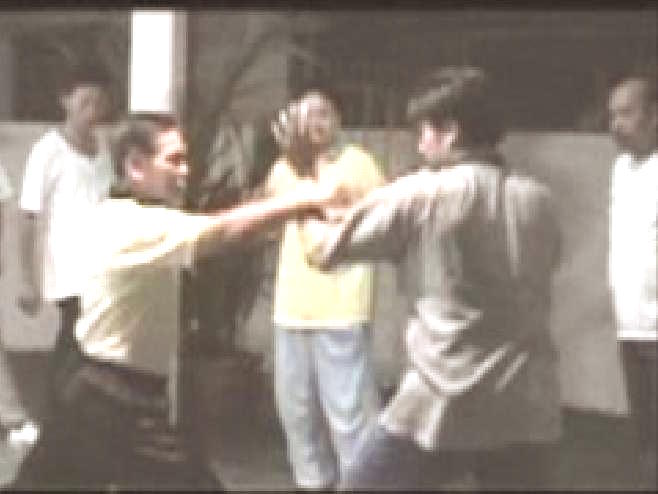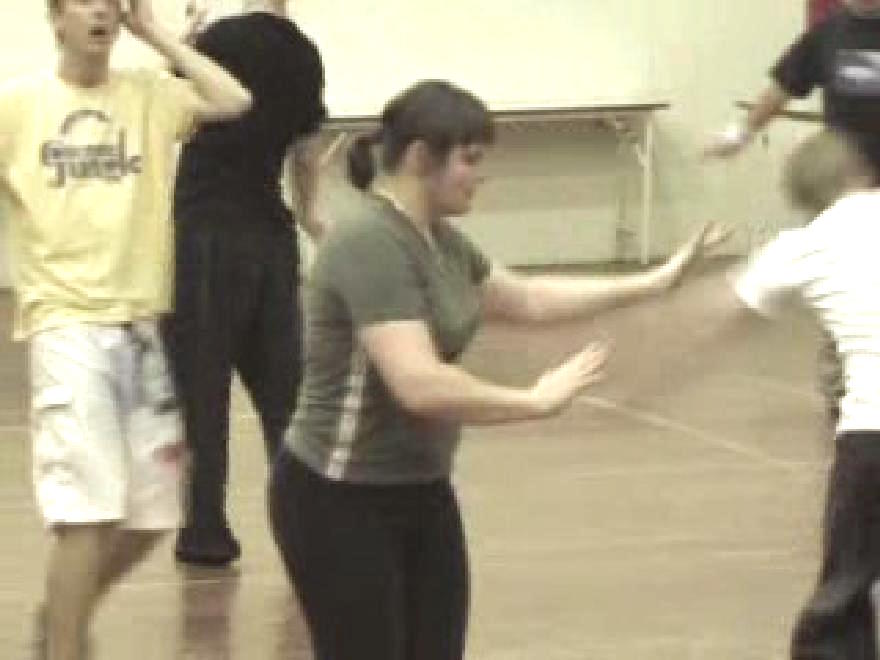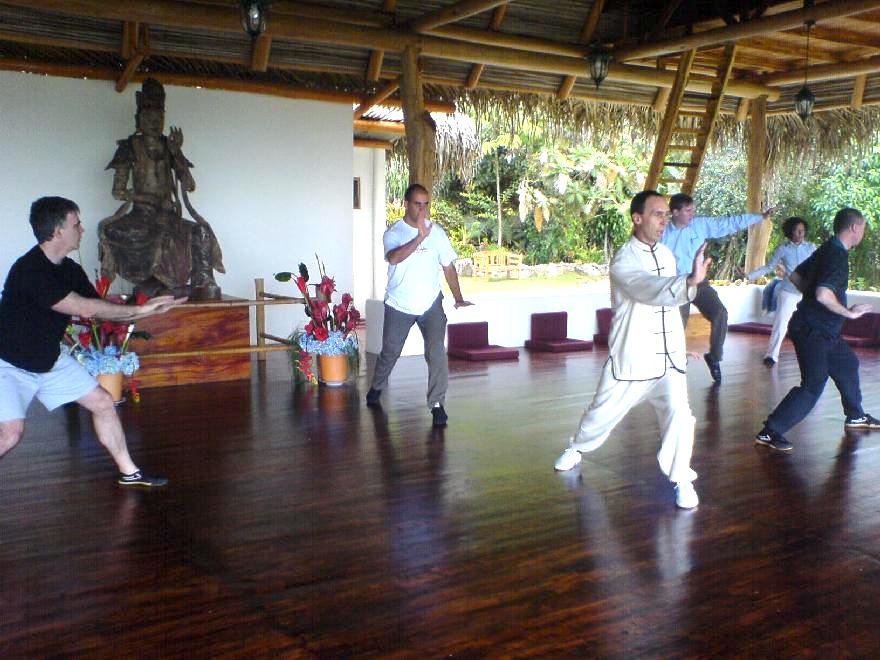November 2007 (Part 3)
SELECTION OF QUESTIONS AND ANSWERS

A picture culled from an old video showing Grandmaster Wong teaching some disciples loyal to him in his house at night after he left the Shaolin Wahnam Association in Sungai Petani due to some policy difference. From left to right are Ong Kong Beng, Grandmaster Wong, Goh Kok Hin, Tai Chee Yong and Tan Chin Sim.
Question 1
Firstly I would like to sincerely thank you for all your work in spreading genuine knowledge on the Shaolin arts. Your books and website have been an invaluable source of inspiration to me and many of my friends.
— Max, England
Answer
Thank you for your kind words.
We in Shaolin Wahnam are dedicated to spread the wonderful Shaolin arts to deserving people and preserve them for posterity. I founded Shaolin Wahnam about twenty years ago because there was a real risk that the Shaolin arts could disappear from the world within two generations due to the rapid and ridiculous degeneration of kungfu at the time.
The hallmarks of great kungfu are internal force and combat efficiency, but more than 90% of those who practiced kungfu had none of them. Most of them, including masters, only performed external kungfu forms for demonstration. Some of them were not even healthy. The situation is slightly better today. Many kungfu practitioners nowadays can spar, although they use other martial techniques, whereas twenty years ago most of them couldn't!
For the first ten years our Shaolin Wahnam activities were localized. We did very well locally but, as expected though it may be surprising to outsiders, we also had many critics and distractors. It was only in the last ten years, after some policy differences I had with the local Shaolin Wahnam Association, that I left home to travel the world to teach. I am glad that I did. I have some excellent disciples, and now I know that if I were to retire tomorrow, these disciples will carry on their excellent work to preserve the wonderful Shaolin arts.
Question 2
I have been practicing kung fu now for several years (Elephant Fist), but it is only recently that I have taken a serious, renewed interest in the martial arts, namely the internal styles, following my dissatisfaction on some levels with the instruction I've received, which while very effectual for combat lacks any Chi Kung training. My teacher told me that when he asked his teacher about Chi Kung, he was told to continue with his practice, and 'the Chi will come'.
Answer
It is true that the chi will come after many years of practice if the practitioner is practicing low level chi kung. But if he only practices external kungfu or chi kung forms, there will be no chi no matter how long he may practice.
On the other hand, if kungfu is practiced as a high-level internal martial art, chi can come immediately. In our Shaolin and Taijiquan classes, for example, our students enjoy a chi flow immediately after any Shaolin or Taijiquan movements. And when they enter into Standing Meditation after the chi flow, they can often feel a noticeable increase of internal force, especially at their hands and arms.
But your experience is the norm. In fact if your Elephant Fist teacher is effectual in combat, especially if he uses Elepahant Fist, it is already a great achievement. Shocking it may be, but the fact is that most kungfu teachers today, including some masters, are incompetnet in combat. Those who are competent, employ other martial technqies rather than their own kungfu. On the other hand, those kungfu masters who can use kungfu for combat — the rare minority — are extremely combat efficient.
The situation regarding chi kung in kungfu is worse. If kungfu practitioners do not know how to apply kungfu for combat, at least they can use other martial techniques or even fight randomly. But if they do not know chi kung, it is more difficult to pretend that they do. However, this does not prevent many kungfu practitioners, including masters, pretending, though many of them may not even realize their pretence. They beleive they are practicing chi kung when in fact they are not.
Question 3
I recently spent 6 months in Northern China practicing Chen Style Taiji and Chi Kung. While the instruction was again sub-standard, partly due to communication problems, I resolved to keep training the Chi kung I'd learnt daily, keeping in mind the principles I'd learnt via your books.
The routine consists of a stretch and warm up, followed by some static postures which I was told were Taiji zhan zhuang postures (including the Three-Circle Stance), and some moving patterns. I conclude the session with warming the stomach, eyes, kidneys, etc., and by patting and shaking the whole body. The training takes about half an hour. I always feel refreshed and 'internally cleansed' after practice, and always feel tingling sensations in my arms and hands, and sometimes in other parts of my body.
Answer
The stretching and warming up are physical exercises. The zhang zhuang postures and moving patterns are chi kung exercises. Warming the stomach, eyes and kidneys as well as patting and shaking your body are exercises to conclude a chi kung session. They help to spread chi over your body.
Feeling refreshed and internally cleansed are sure signs that you have practiced your chi kung session well.
Remember that zhan zhuang is a very powerful exercise, and should be practiced with care. You should not tense any muscles or think of anything while practicing zhang zhuang.

When Shaolin Kungfu is practiced as a high-level internal art, even movements in sparring can generate a vigorous chi flow. Here, participants at the Sabah Shaolin Kungfu Course of March 2007 enjoy a vigorous chi flow after a sparring session.
Question 4
I also practice “Lifting the Sky” and “Lifting Water” as described in your books.
Answer
These are two excellent chi kung exercises. Just follow the instructions in my book respectfully. For example, if an instruction is “Be relaxed”, just do that, i.e.be relaxed. Don't worry how you can be relaxed or what happen if you do not relax.
I would recommend that you attend one of my courses or learn from one of our certified Shaolin Wahnam chi kung or kungfu instructors. We have quite a lot of instructors in England. Please see the England section of our List of Instructors. Judging from your learning experiences in China and elsewhere, you would probably be very surprised at the result you get learning from us. This statement may sound boastful, but it is true.
I would not want a sincere, respectful student like you to miss the wonderful benefits of high level kungfu or chi kung. If you learn from one of our Shaolin Kungfu or Wahnam Taijiquan instructors, for example, you don't have to practice for many years for chi to finally appear; you would unmistakably feel chi and internal force within a few weeks. You also don't have to routinely hurt yourself in free sparring using Kick-Boxing techniques; you will be able to spar competently using the Shaolin or Taijiquan patterns that you practice.
Question 5
When we trained in China, Shifu told us to breathe in through our nose and mouth simultaneously, and out through the mouth, whereas another teacher there (who practiced a different style of Chi kung) discouraged breathing out through the mouth, claiming that it allowed Chi to escape. Are there different breathing techniques for different exercises?
Answer
Yes, not only there are different breathing techniques for differenct exercises, different teachers or schools may use different breathing technqiues for the same exercise. Sometimes the same teacher may use different techniques for the same exercise for different purposes.
It is best to follow the instructions of the particular teacher teaching the exercise. Of course, it is understood that he must be a competent teacher. Unfortunately, many teachers today are incompetnet in their teaching, and may cause harmful effects to their students.
In general it is best to breathe in gently through the nose and breathe out gently through the mouth — whether in chi kung or in ordinary life. It is because breathing in through the nose and breathing out through the mouth is most natural and gives the best benefits.
In special situations, like when you are swimming, for example, you would have to breathe in and out through your mouth. If you wish to slow down your breathing, like in deep meditation, you may breathe in and out through your nose.
The purpose of breathing out is to let chi excape. It is a mis-conception among some people, including some masters, that one should prevent chi escaping as escaping chi may weaken a person. This is a serious fallacy, and is due to confussing chi flow with chi drain.
Chi flow is natural and healthy, chi drain is harmful. In chi flow, when chi escapes, fresh chi comes in. This is a natural process unless you purposely prevent it from happening like tensing your muscles. In other words, when you open your mouth to let chi escape, without you having to do anything. fresh chi will flow in from the cosmos to replenish the chi that has escaped.
Chi drain is one way, with chi escaping but no fresh chi coming in. If you overwork yourself in vigorous exercise where you tense your muscles, you may drain your chi. Chi may escape through other ways besides your mouth. If you have excessive sex or excessive intellectualization, your chi may drain away.
Opening your mouth to let chi escape is essential in some kungfu and chi kung exercises if you do not wish to harm yourself. In “fa-jing”, or explode force, for example, like in executing a powerful punch, you should not only open your mouth but also let out a shout, which will not only enhance the force of your strike but prevent possible harm from back-flow of force if you close your mouth. Some well known Taijiquan masters closed their mouth when exploding force. Their strikes were powerful but they might have harmed themselves too. This might be a reason why, sadly, they did not live as long as they should.
Question 6
When I practice (mainly during standing meditation), sometimes I feel as if I am 'decentralized'. It is hard to describe, it is as if parts of my body are facing a different direction than they really are, or twisting in different directions. The feeling is strange, but not unpleasant. I put it down to internal movements of chi, and I try not to pay attention to it.
Answer
This is an indication of your progress. Your spirit, which is the real you, is readjusting yourself with your body. One day you may, or may not, find yourself outside your physical body. Don't be alarmed. This is a verification of the teaching of great masters who say that you are more than your physical body.
Don't worry about such development, nor crave for it. Just carry on and enjoy your practice.

Taijiquan is an internal martial art, as demonstrated here by Sifu Rama, Sifu Piti and others at the Guan Yin Temple on the Blue Mountains in Costa Rica. But for some people for special purposes, practicing Taijiquan as a dance may be more beneficial.
Question 7
I have suffered with severe eczema for over a year now, and it seems to be receding since practicing Chi Kung along with good diet and the Chinese herbal medicine I have been taking. So I assume that I am on the right track. I would greatly appreciate any advice you could give me.
Answer
Yes, you are on a right track. Chi kung, especially high-level chi kung, will not only overcome your health problem, but give you good health, vitality, longevity, mental freshness and spiritual joys.
Question 8
I was hoping that I could speak with someone like Grandmaster Wong about the cultivation practice of Falun Dafa or Falun Gong. I was a U.S. practitioner for a few years. Previous to that I practiced yoga. I stopped my practice because I felt some corruption and that things were wrong with that cultivation practice.
I was wondering if Grandmaster Wong is aware of this movement and has anything to say against it. I had terrible “tribulations” that were supposedly due to this practice. After years of intense meditation and Eastern tradition I need a more “moving” form of meditation like Chi Kung. My life has been in total upheaval for the past year. I lost everything and had to move home. I am having spiritual problems and it is effecting my mind and physical body.
— John, USA
Answer
I would not want to comment on Falun Dafa or yoga, but the following advice would be very helpful to you.
If you feel uncomfortable with any practice, don't continue practicing it. Leave it behind and find something else that is pleasant and rewarding. Your new pursue needs not necessary be chi kung or meditation; it may be some enjoyable pastime like playing a musical instrument or engaging in a sport.
After “years of intense meditation and Eastern tradition”, you feel terrible tribulations. Something has gone basically wrong. It is not the disciplines you practice that are at fault, but the way you have practiced them.
You are not yet ready for intense meditation. I would advice that you leave meditation aside for the time being. You probably have a mis-conception about Eastern tradition. You should leave out any serious study of life and the universe for the time being, and enjoy yourself with something light and gentle. Practicing Taiji dance would be a good choice.
For you at present, you need not worry about genuine Taijiquan as an internal martial art. Don't worry about Taiji philosophy or combat application. Just find a teacher who teaches graceful Taiji movements. Practice them for fun. Do not think of anything and do not tense any muscles in your practice. Just enjoy the graceful movements, but take care not to bend your knees too forward as this may cause knee injuries.
Practice some Taiji movements every morning. Before your practice, stand upright and be relaxed. Then smile from your heart. Do the same at the end of your paractice.
LINKS
Selected Reading
- Beginning to Learn some Monkey Tricks
- How would you Defend against a Versatile Three-Sectional Staff?
- What you Learn at the Special Shaolin Kungfu Course
- Sharing the Happiness of my Class
- Wahnam Taijiquan and Noodle Making
